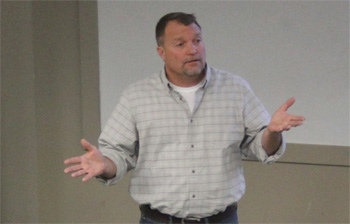Queer noun /’kwir/: a homosexual person, according to Merriam-Webster Learner’s Dictionary. Once a taboo word, it is now being reclaimed as an identity for the gay community – as a verb. Queering verb /’kwir • ing/: what it takes for queer identity to be accepted as “normal,” according to Illinois State Associate Professor of Philosophy Chris Horvath.
This reclaimed identity is part of a new course Horvath is teaching, WGS 292: Introduction to LGBT/Queer Studies. It introduces students to the field of LGBT studies and the perspective of queer theory. According to Horvath, queer theory reaches beyond the biological when looking at sex and gender. “Femininity and masculinity are not a product of biological process,” he said. “We expect people who have female bodies to behave in feminine ways. We reward women who succeed in meeting this expectation and we punish women who fail.”
The class urges students to rethink the idea of “normal,” and understand that society’s current emphasis is placed on a “heteronormative culture,” or the idea that normal is based on heterosexual identifiers. “Gender and sexuality are primarily a product of social construction. Heteronormative culture is a system of obsession that privileges some people based on their sex, gender and sexuality,” stated Horvath.
Central topics within the course include LGBT identity, politics and history of queer theory, noted Horvath. “We’ll look at the ways in which LGBT identity intersects, and is mediated by, race, class, gender and other social variables.”
Director of Women’s and Gender Studies Alison Bailey explained gender expression is complex and does not fall neatly into a two-party system. “Queer theory begins with the study of the categories we use to describe sex, gender and sexuality,” and Bailey. “These labels – female and male, feminine and masculine, man and woman – are more than benign categories. They are profoundly political and have important cultural, social and legal implications.”
Horvath said that many universities already have queer studies programs and adding this new class to the curriculum is an important step for Illinois State to move forward. “We are excited to be working on this and we are really excited Dean Gregory Simpson (of the College of Arts and Sciences) is supporting this effort,” said Horvath. “He has given us a lot of resources to help.”
He explained that the class is not a support group, it’s a serious research and theory course that studies LGBT people. One of the benefits is that adults will become more familiar and understanding in their interactions with LGBT people. “Also, this class will give students the tools they need if they choose to move into a special-topics class at the next level,” said Horvath.
Bailey hopes to offer a certificate in queer studies and possibly a minor.

